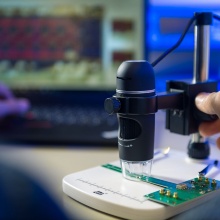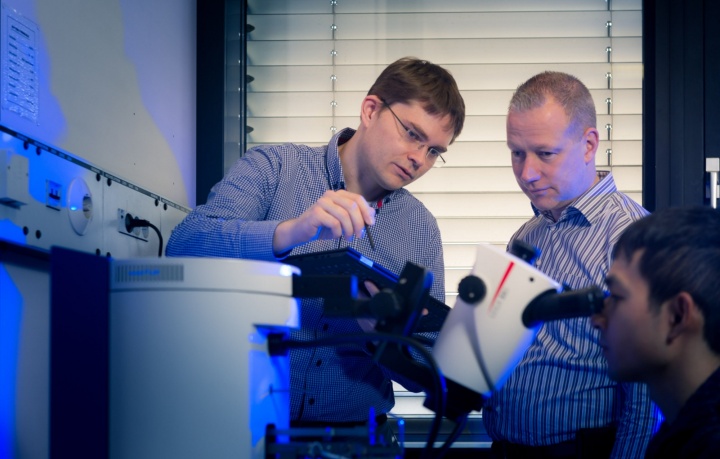On 3 February, Federal Minister of Education and Research Anja Karliczek announced the winners of the “Clusters4Future” competition run by the German Federal Ministry of Education and Research (BMBF). Among the winners is the cluster “Quantum Sensors for the Future” (QSens), in which the universities of Stuttgart and Ulm will work together with the Institute for Microelectronics Stuttgart (IMS CHIPS) as well as a variety of partners from industry. It researches innovative quantum sensors that can achieve a whole new level of sensitivity and spatial resolution. Applications range from personalized medicine and autonomous driving to information technology. The University of Stuttgart scientifically coordinates the cluster by Prof. Jens Anders (Institute of Smart Sensors, spokesperson) and Prof. Jörg Wrachtrup (Institute of Physics (3). Contact persons at the University of Ulm are Prof. Fedor Jelezko and Prof. Joachim Ankerhold.
The cluster aims to build a regional innovation ecosystem that significantly reduces the high barriers to entry for the increasing use of quantum technologies. Over the next ten years, the BMBF will sponsor the Clusters4future program with up to 450 million euros of funding, and a similar amount will be provided by the business community.
After the announcement by the Minister of Education and Research Anja Karliczek, Prof. Wolfram Ressel, Rector of the University of Stuttgart, said: “I congratulate all the scientists of the Universities of Stuttgart and Ulm involved in the QSens cluster as well as their research partners in the industry for being selected as one of the winners of the BMBF competition. This high-profile funding will contribute towards systematically developing the emerging field of quantum technology at the University of Stuttgart and further expanding the research expertise at the University of Ulm. It will make our research in this important field even more visible.”
“The long-term strategic cooperation in quantum technology between the universities of Stuttgart and Ulm forms the basis of the new cluster. “QSens” means we can work together with industry partners to transfer the results from basic research into promising, value-adding applications more quickly and with a stronger focus”, said the President of the University of Ulm, Prof. Michael Weber, about the successful performance of “QSens”.
The industrial perspective on “QSens” is added by one of the industry partners, Michael Förtsch, CEO of the quantum technology start-up Q.ANT said: “Quantum technology is a great opportunity for Germany and for the Stuttgart region. The “QSens” cluster, which focusses on quantum sensor technology, helps us develop viable solutions for the medical industry, the automobile industry, and data security. This way, we strengthen the ability of the economy to innovate and create long-term employment in the region.” Q.ANT is a subsidiary of TRUMPF, which developed the world’s first usable sensor, which uses quantum optics for series production.
Strong demand on the market
Quantum technology is a new field of research that combines quantum physics with practical aspects of engineering. Here, quantum effects such as entangling two photons or the energy states of an atom are used for applications in the fields of quantum communication, quantum sensing, quantum simulation, and quantum computing. Quantum sensing, in particular, has a lot of potential for producing the first industry-relevant applications in the foreseeable future and of covering the growing need for high-precision sensor technology, both in the industry as well as the consumer sector. Because of this, the “QSens“ cluster initiative has set itself the goal of transferring the groundbreaking results from basic research, which have been achieved in Stuttgart and Ulm in recent years, into tomorrow’s quantum products.
The technologies developed as part of “QSens” should give Germany a technological edge over the competition as a place to do business. Moreover, they should make a decisive contribution towards solving some of our era’s most urgent problems – entirely in keeping with the University of Stuttgart’s vision of “Intelligent Systems for a Sustainable Society”.
As one example, the use of quantum sensors in clinical diagnostics or in medical or biological research has the potential to overcome the limits of currently existing sensor technology, analytics, and imaging, and thus open up new opportunities in biotechnology and medical engineering. In autonomous vehicles, quantum sensors could improve on traditional sensors and increase vehicle safety and make some functions possible for the first time. Quantum sensors will also play a key role in storing energy in batteries because they make it possible to obtain detailed information about the function, state-of-charge and state-of-health of battery systems.
The entire supply chain at a glance
Unlike most of the joint projects, “QSens” includes an “innovation ecosystem” that covers the entire supply chain for the researched sensors. The universities of Ulm and Stuttgart have a long-standing collaboration with the industrial “QSens” partners Bosch, Zeiss, Trumpf, and Bruker through the joint interdisciplinary Center for Integrated Quantum Science and Technology (IQST). The industrial consortium is supplemented by biotechnology and pharmaceutical companies such as Boehringer Ingelheim and Rentschler.
Further cooperations exist with the state research institution IMS CHIPS and the future quantum technology headquarters of the German Aerospace Center in Ulm (DLR-QT). With research facilities such as the Ulm Center of Quantum Bioscience (ZQB), the Stuttgart Center for Applied Quantum Technology (ZAQuant), and the companies’ own infrastructure, the “QSens” cluster has a unique research environment at its disposal.
“QSens” also contains dedicated measures to transfer knowledge to its industrial partners and for fabless manufacturing of quantum sensors for small and medium enterprises (SMEs) via the platform “Quanten4 KMU”. Thereby, “QSens” will significantly lower the entry barriers to the use of quantum technology for SMEs. Additionally, QSens will feature a quantum incubator to stimulate and foster spin-offs originating from the cluster.
The “Clusters4Future” competition
With the open-topic competition “Clusters4Future”, the BMBF hopes to increase knowledge and technology transfer as part of the High-Tech Strategy 2025. The seven future clusters were selected in a multi-stage process by an independent team of expert jurors. A total of 137 applications were submitted as part of the competition.
Expert Contact:
Prof. Dr. Jens Anders, University of Stuttgart (spokesperson), Institute of Smart Sensors and Theoretical Electrotechnology, Phone +49 711 685 67250, E-Mail
Prof. Jörg Wrachtrup, University of Stuttgart, Institute of Physics (3), Tel. +49 711 685-65278, E-Mail
Prof. Dr. Joachim Ankerhold, University of Ulm, phone +49 731 50-22831, E-Mail



